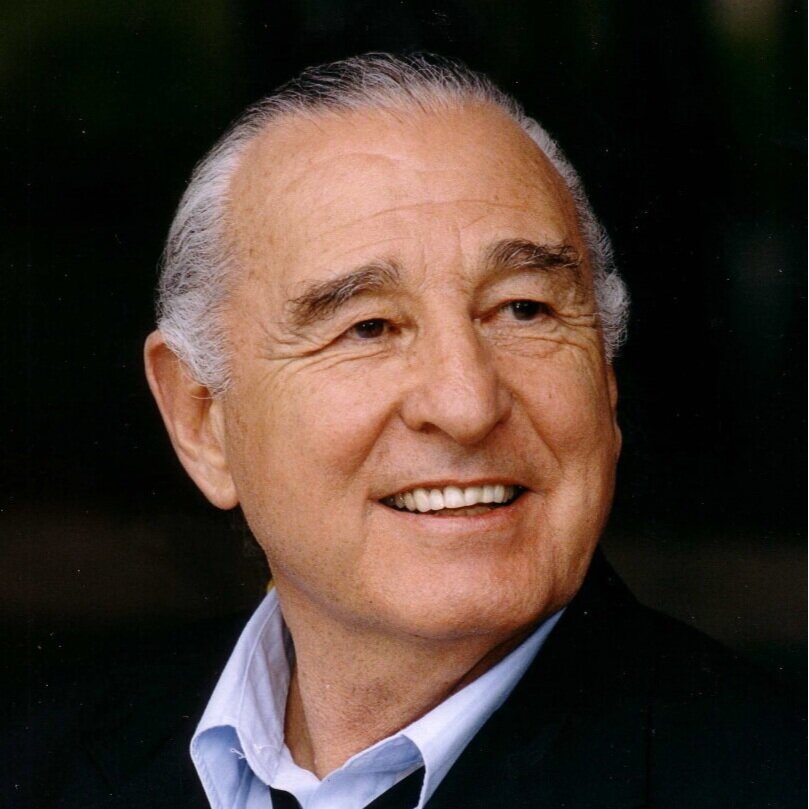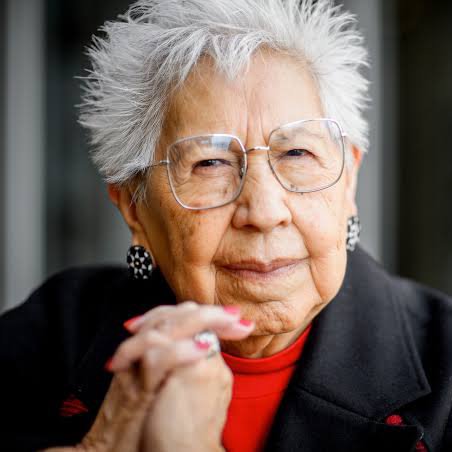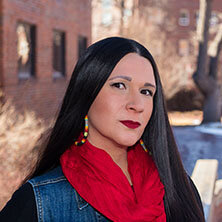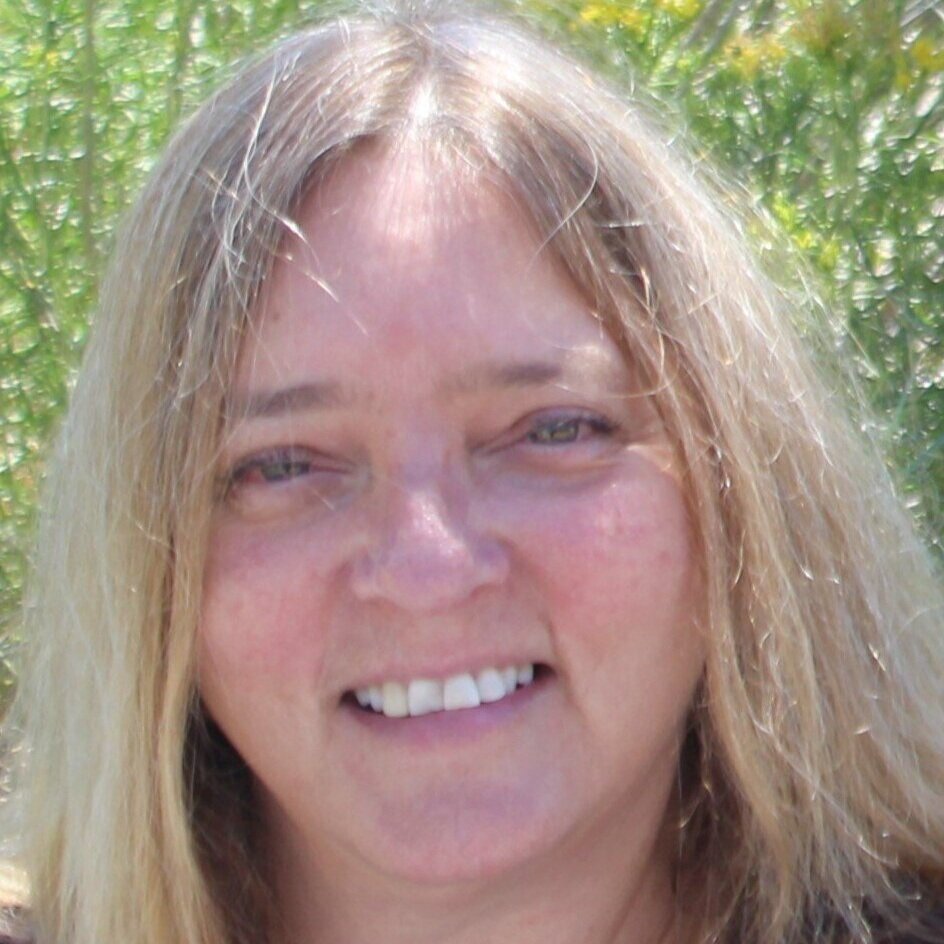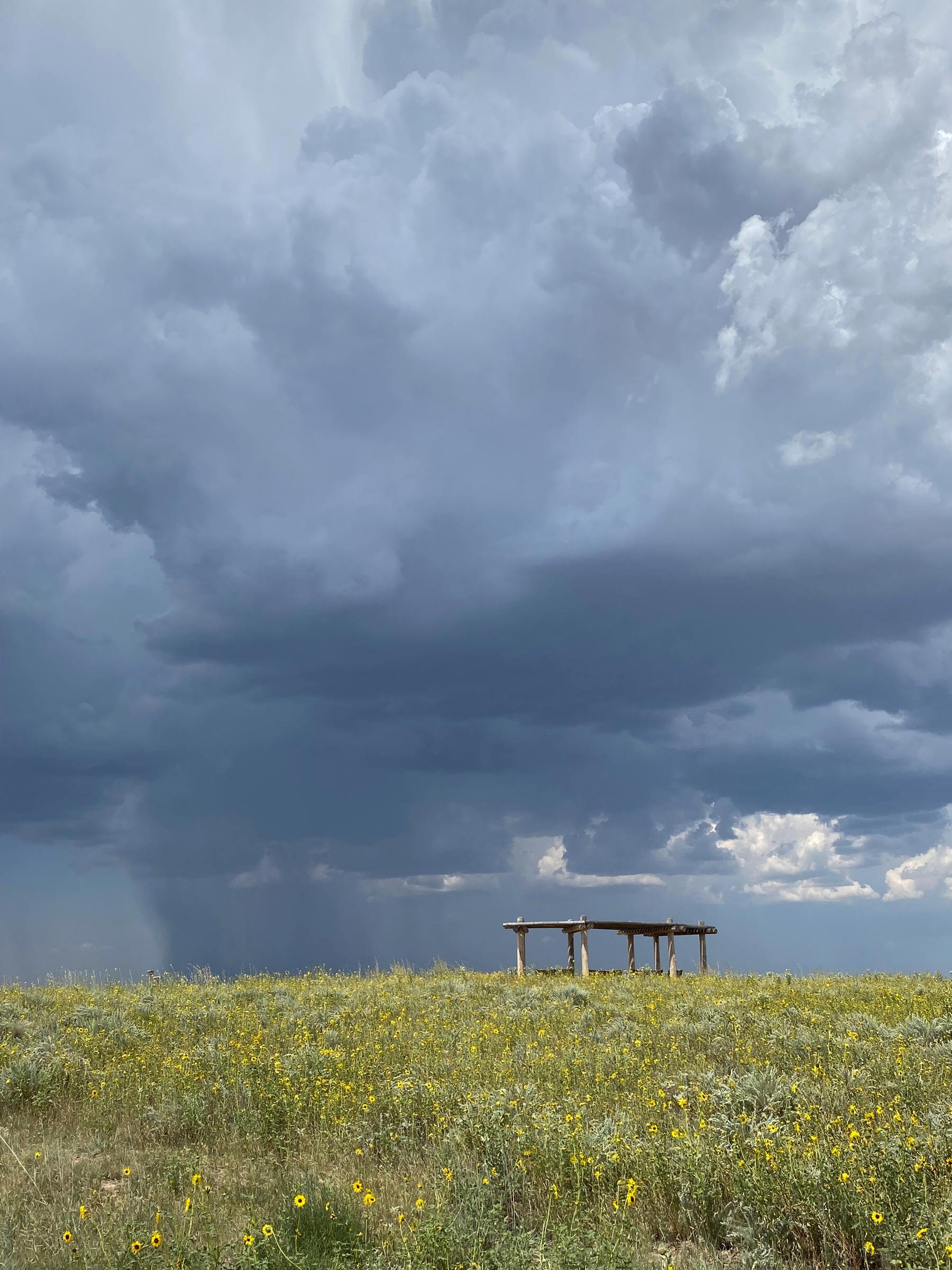
Board & Advisors
Board of Directors
The Board of Directors represents leadership in historical, cultural, and educational expertise. Board membership is composed of individuals who have been involved with the Sand Creek Massacre site in various capacities, including the National Park Service, History Colorado, the Colorado Commission of Indian Affairs, the Northern Cheyenne Tribe (Montana), the Northern Arapaho Tribe (Wyoming) and the Cheyenne and Arapaho Tribes (Oklahoma).
Executive Director
The Executive Director supports the Board of Directors, manages the foundation’s day-to-day operations, proposes and prepares specific programs and activities that further the foundation’s purposes, and directs and supervises the implementation of programs and activities approved by the chair and the board.
-
Elleni Sclavenitis’ background is in art and filmmaking. Recent work includes a 30-minute documentary, Only the Earth and the Mountains, about the ongoing impact of the Sand Creek Massacre, as well as a 6-minute film written by Sand Creek Massacre descendant, Dr Richard Littlebear, titled Heseovo’eo’he’e (Sand Creek Massacre), produced for History Colorado’s exhibit, The Sand Creek Massacre: The Betrayal that Changed Cheyenne and Arapaho People Forever. Elleni received her MFA from California Institute of the Arts. She is based in Denver, Colorado.
Board of Advisors
The Board of Advisors, selected for their expertise and knowledge, provide professional and objective advice, recommendations, or networking connections to the Board of Directors. The advisors act as consultants, reviewing ongoing initiatives and contributing to the foundation’s strategic plan.
-
JuDee has worked closely with the Northern Cheyenne Tribe in Montana for many years and has been pivotal in forming a relationship between the Tribe and the Methodist Church, beginning with her parish in Sheridan, Wy. JuDee's work has grown to include the larger church and lead to in-depth research and a book about the role of the Methodist Church in the Sand Creek Massacre, specifically Col. Chivington and Colorado Gov. John Evans, who were both Methodist ministers at the time. This awareness of the connection to the Sand Creek Massacre led to Methodist donations and participation in efforts identified by descendants. JuDee currently serves as the Chair for the Native American Ministry of the Methodist Church with a focus on participating in and supporting efforts of education and healing related to the Massacre at Sand Creek.
-
Coming Soon
-
Jeff Campbell has been associated with the Sand Creek Massacre site since 2001, conducting research, locating primary sources and providing information to the NPS. He served as a seasonal park interpretive ranger and continues to serve as a volunteer interpreter as needed. He assisted in preservation efforts at Bent's New Fort and has spoken on subjects regarding Colorado, Arkansas Valley and Sand Creek Massacre history in Colorado, Texas and Montana. He has been a panelist for the Western History Association, the Wild West History Association and the Sand Creek Massacre 150th Commemoration Symposium at the National Museum of the American Indian, among others. He is a former Senior Special Agent with the New Mexico Attorney General's Criminal Investigations Division where he was a career criminal investigator. He brings an investigator's perspective to his analysis of the massacre which he refers to as an "unindicted" mass murder. From that perspective, he has conducted analyses of the controversial Hungate murders, the deaths of Captain Silas Soule and Lt. James D. Cannon, and compiled a compendium of common misconceptions about the massacre and the personalities involved.
-
Cindy is a Professor Emerita, Dept of Integrative Physiology, University of Colorado, Boulder. Her father was Raymond G. Carey, Professor of History at the University of Denver. He did research on the Sand Creek Massacre and his papers are housed at the Special Collection Department, University of Denver.
-
Tracy is based in Denver and serves as the Colorado Program Manager for the National Parks Conservation Association. She is proud to have the opportunity to celebrate Colorado's incredible national parks and advocates, and is especially invested in efforts to protect and grow cultural resources and the park story toward a fuller representation of America. Prior to NPCA, Tracy served as Senior Legislative Counsel on public lands policy at Earthjustice and worked on campaigns to protect national forests, parks, and monuments primarily in the Southwest and Northern Rockies. She has a master’s degree in environmental policy and a JD from Vermont Law School and a bachelor's degree from Yale University.
-
Dawn is the Chief Operating Officer for History Colorado. She is the lead developer of the Borderlands of Southern Colorado initiative and the founder of Museum of Memory, a public history initiative of History Colorado that works together with Colorado residents to co-author a shared history. DiPrince was selected as one of 21 inaugural international Creative Community Fellows for National Arts Strategies for her work using memory and writing as creative placemaking. She was Co-Chair of the Governor’s Ludlow Centennial Commemoration Commission. She is a co-founder of Bridging Borders Teen Girl Fellowship, which is dedicated to the belief that a greater sense of place and a greater sense of history are the building blocks of a strong self-identity.
-
The Honorable Troy Eid served as the 40th United States Attorney for the District of Colorado, appointed by President George W. Bush, and as Chair of the Indian Law and Order Commission under President Barack Obama. Troy co-chairs the American Indian Law Practice Group for Greenberg Traurig LLP (www.gtlaw.com), an international law firm, and is also Adjunct Professor of Native American Nations & Federal Law at the University of Denver-Sturm College of Law. He is President emeritus of the Navajo Nation Bar Association, the largest non-profit legal services organization in the country that directly serves a Native American Tribe. Troy lives in Morrison, Colorado with his wife the Honorable Allison Eid, a Judge of the United States Court of Appeals for the 10th Circuit, and they have two adult children. An aging but undaunted distance-runner and ultra-marathoner, Troy's longest footrace covered 200 miles in 71 hours, 2 minutes on his 59th birthday weekend in November 2022.
-
Coming Soon
-
Coming Soon
-
Todd is an Educational Consultant with Father Patrick Desbois’ Yahad-in Unum, based in Paris, France, where he has facilitated educational initiatives in Europe and North America. He has participated in research and field investigations focusing on the systematic mass murder perpetrated by Nazis and their collaborators during the Holocaust in Eastern Europe. Todd is also an Educator and Board Member with the Colorado Holocaust Educators, an internationally recognized Holocaust educational institution based in Denver, CO. Previously, Todd was a middle and high school social studies teacher with two different school districts in Colorado. He is a 2000-2001 Museum Teacher Fellow with the United States Holocaust Memorial Museum and a 2015 Faculty Fellow with the Museum of Jewish Heritage’s Auschwitz Jewish Center in Oswiecim, Poland. Currently, Todd is a career firefighter/EMT and Fire Instructor with the South Metro Fire Rescue Authority in Centennial, CO.
-
Coming Soon
-
Karl is Allan Nevins Professor of American History and co-director of the Center for the Study of Ethnicity and Race at Columbia University. He is the author of Crimes Against Nature: Squatters, Poachers, Thieves and the Hidden History of American Conservation, Shadows at Dawn: A Borderlands Massacre and the Violence of History, and The Strange Career of William Ellis: The Texas Slave Who Became a Mexican Millionaire along with many articles and essays on the history of the American West.
-
Ari Kelman is Chancellor’s Leadership Professor of History and Interim Dean of the College of Letters and Science at the University of California, Davis. He is the author, most recently, of Battle Lines: A Graphic History of the Civil War (Hill and Wang, 2015), as well as A Misplaced Massacre: Struggling Over the Memory of Sand Creek (Harvard University Press, 2013), recipient of several national awards and honors, including the Bancroft Prize, and A River and Its City: The Nature of Landscape in New Orleans (University of California Press, 2003), which won the Abbott Lowell Cummings Prize. Kelman’s essays and articles have appeared in Slate, The New York Times, The Nation, The Times Literary Supplement, The Journal of American History, Reviews in American History, as well as numerous other publications. Kelman has contributed to outreach endeavors aimed at K-12 educators, and to public history projects, including documentary films for the History Channel and PBS’s American Experience series. He has received many grants and fellowships, including from the Guggenheim Foundation, the National Endowment for the Humanities, the Huntington Library; served on a variety of editorial boards, program and prize committees; and held several administrative posts.
-
In addition to his position as an Advisor to the Sand Creek Massacre Foundation, Karl also sits on the Board of Directors for the Crow Canyon Archaeological Center which seeks to empower present and future generations by making the human past accessible and relevant through archaeological research, experiential education, and American Indian knowledge. Karl is also on the Board of Hilos Culturales, Inc., an organization with a mission to preserve and teach traditional Indio-Hispanic folk arts and regional traditions, and to ensure their continued vitality. He is also involved with the State Historical Society of Colorado, History Colorado, serving as a member of the Archaeology and Historic Preservation Council and the former Chair of the Colorado State Historical Fund Advisory Council. Karl continues his studies in the history of the American Southwest, including land grant communities and the history of the Southwest Borderlands. Karl practices water and public utilities law in Colorado, teaches water law, and is admitted to practice law in New Mexico and California.
-
Richard (Dick) E. Littlebear was born on the Northern Cheyenne Reservation in Montana USA and grew up in Busby, Montana. He holds degrees from Bethel College in Kansas and Montana State University and received his doctorate degree in education from Boston University in 1994. He is President and Interim Dean of Cultural Affairs at Chief Dull Knife College located in the Northern Cheyenne Reservation. Dr. Littlebear actively promotes bilingualism, advocating for bilingual education on a local, state, national and international level. He encourages the continued oral, written and reading usage of the Cheyenne language specifically, and of all indigenous languages generally. He considers learning to read and write the Cheyenne language - his first language - as his greatest academic achievement.
-
Derek has served as the Executive Director for the City and County of Denver Agency for Human Rights and Community Partnerships since 2011. Prior to this, Derek was the Senior Vice President of the National Civic League from 1993-2011.
-
I am an enrolled member of the Northern Arapaho Tribe and an official Northern Arapaho Sand Creek representative by NA Tribal Resolution. My family are direct descendants of Chief White Antelope. I have had the honor of working on the Sand Creek project for the Northern Arapaho Tribe for the past seven years. Less importantly than the work I do on the SCM Project, I have also served as the CEO of ARAPAHO FIRST the NAT's holding company for all of their for profit business. I have a MBA in Accounting and was the first Non-Governmental employee to obtain the Certified Indian Fiduciary Trust Specialist certificate through the Department of Interior. The Sand Creek Massacre Project is not just part of a job to me, it is a part of my life and is one of my highest priorities. My personal effort is to bridge the generational disconnect that has been created due to the displacement from the massacre. I always remind everyone when I talk to them that if our children forget about the Sand Creek Massacre then those soldiers will have succeeded in what they set out to do on November 29, 1864.
-
Michelle Pearson is an educator, historic preservationist, the 2008 Colorado Technology Teacher of the Year, and the 2011 Colorado Teacher of the Year. She is half of the team Two Geeky Teachers. She works diligently to promote the use of primary sources, historic artifacts and historic places in the classroom. She was formerly an education and historic preservation professional at History Colorado and is an educator in the Adams 12 school district. She is currently a VOYA STEM Fellow and is a White House Historical Association Fellow in Education.
Michelle collaborates with local, state, and national partners to develop curriculum and resources for educators in history, historic preservation, STEM, and other content areas. She has served as a docent and collections support volunteer for the Smithsonian Institution and the Department of the Interior, contributes to the design of online digital collections and resources for students and educators with History Colorado, and supported the founding of the Preserve America Youth Summit.
Michelle continues to serve as a national trainer for educators, higher education professionals, local boards, commissions, and city council members. She collaborates with various tribal organizations and is currently supporting the writing of curriculum for the National Native American Veterans Memorial in Washington DC. As an outgrowth of that work, she recently contributed to the book Warrior Spirit as an author to illuminate the service of Native American Veterans. She is a trainer in educational technology, primary sources and museum services with a focus on outreach and communication to stakeholders and the management of social media and programming. She blogs for EdWeek, Education Post, and the New York Times on pressing educational issues and is the author of the books Sacred Places of Denver, and Historic Sacred Places of Denver for Children and Families as well as numerous curriculum and lesson plans which are published online and in print with NEH, RMPBS, Colorado Experience and others.
-
As the principal at Strasburg High School, we have enjoyed a very special partnership with the Northern Arapaho Tribe since 2015-16. We are the Indians, and senior Lindsey Nichols wanted to explore the origins of our name. We contacted leaders of the Northern Arapaho (the Ridgelys and Ryan Ortiz) since the tribe once lived where Strasburg is now located. Their approval of our partnership was formalized through a resolution signed by their Business Council and our School Board. Lindsey and I had the privilege to serve on the Governor's Commission to Study American Indian Representations. We have hosted tribal members to our school on several occasions and been guests on the Wind River Reservation. A major part of our partnership is the ongoing education of our students of Native American history and culture. We teach our students the tragic events of the Sand Creek Massacre. Many tribal members have ancestors that were victims at Sand Creek. With their input I have developed resources that are shared with our students. We take students to the Sand Creek Massacre Site each year and taken part in the ceremony following the Sand Creek Run. By educating ourselves about the tragedy at Sand Creek we have developed a deeper understanding of the Northern Arapaho people.
-
Gary L. Roberts, Emeritus Professor of History, Abraham Baldwin Agricultural College, Tifton, Georgia, has been researching the Sand Creek Massacre since 1963. His Master's thesis, (1967) and his Ph.D.dissertation (1984) were both about Sand Creek . He has published several articles related to Sand Creek.. Most recently he authored MASSACRE AT SAND CREEK: HOW METHODISTS WERE INVOLVED IN AN AMERICAN TRAGEDY (2016). He remains actively involved in research for a comprehensive book on the Sand Creek Massacre. Since 1967, Roberts has presented numerous unpublished papers to organizations including the Order of the Indian Wars, History Colorado, the Western History Association, the Tesoro Foundation,, and the National Museum of the American Indian. He has served as a consultant to location and development to the Sand Creek Massacre Site since 1997. He has also consulted with the Cheyenne and Arapaho Tribe of Oklahoma, the Northern Cheyenne Tribe of Montana, and the Northern Arapaho Tribe of Wyoming. From 2013 to 2016 he consulted with the Rocky Mountain Conference on the role Methodists played in the Sand Creek Massacre. In 2016, he authored the report, which was adopted by the Annual Conference and simultaneously published by Abington Press as a book.
-
Sheldon Spotted Elk (Northern Cheyenne) is a direct descendant of Ho'weche Charles Spotted Elk, who was orphaned at the Sand Creek Massacre. Sheldon works nationally with the Indian Child Welfare Act and as a judge for a tribal court of appeals. He has taught adjunct courses and has provided lectures at many law schools throughout the country. He was recognized as a NCAIED 40 Under 40 recipient, a prestigious award which recognizes 40 emerging American Indian leaders from across Indian Country. He is a graduate of University of New Mexico School of Law. He and his two sons live in Denver.
-
Here is a little about me: I was born in Lawrence, Kansas, near to where my ancestors migrated in the time before the Civil War, 1854-1859. All four of my great grandparents on my mother's side were young people belonging to families that believed in freeing the slaves. They arrived from New Hampshire, Massachusetts, Maine and Ohio. Silas Soule, his brother William (my great grandfather,) his parents, and two sisters were among them. My father worked in soil conservation for the US Department of Agriculture in South Dakota, where I grew up, first at Kadoka, near the Pine Ridge reservation, then at Mobridge, near the Standing Rock reservation. I received a bachelor's degree in chemistry from (then) Sioux Falls College, and a master's degree in analytical chemistry from Iowa State University. After serving in Viet Nam as an infantry cook and clerk, I taught chemistry for 31 years, 30 of those at the Des Moines Area Community College in Ankeny, Iowa. My home is in Des Moines. I have been married for 48 years, have two daughters and 5 grandchildren. I have participated in the Healing Run activities about every other year. My website, Silas-Soule.com, lays out what I know about Silas and his family.
-
Karen Wilde is the Tribal Relations Specialist for the USDA U.S. Forest Service, Mark Twain National Forest. Previously, she was the Tribal Liaison for the Sand Creek Massacre National Historic Site, National Park Service. She worked with park management to actively engage in consultation with the Tribes of the Cheyenne and Arapaho. At the National Park Service, Karen served on the Intermountain Region writing team for the draft management guidance on Sacred Sites, she is Co-Chair of the service-wide American Indian volunteer employee group, Council for Indigenous Relevancy, Communication, Leadership and Excellence (CIRCLE), and is a lifetime member of Society of American Indian Government Employees (SAIGE). Her community involvement includes gubernatorial appointments such as the Board of Trustees of a Colorado higher education institution, a member of the Juvenile Justice & Delinquency Council State Advisory Board, and a member of the Colorado 15th Judicial District Nominating Commission. Karen is a first-generation college graduate, holds a paralegal certificate, and is currently pursuing a Master of Jurisprudence in Indian Law (MJIL). Karen is a mother, grandmother, and a proud citizen of the Muscogee Nation.
-
Karl was raised in Greeley, Colorado and graduated from Greeley Central High School. In 1976 he graduated from Colorado State University with a bachelor's degree in Zoology and in 1977 with a bachelor's degree in Park Management. He immediately began working for the National Park Service first at Wind Cave National Park, followed by Muir Woods National Monument, Bent's Old Fort National Historic Site, and finally Sand Creek Massacre National Historic Site. He began working at Sand Creek Massacre National Historic Site in 2003 as Chief of Natural Resources. In 2016 he received the Director's Award for Resource Management in a Small Park. Karl retired in 2020 as the Park Operations Manager with more than 40 years with the National Park Service.


